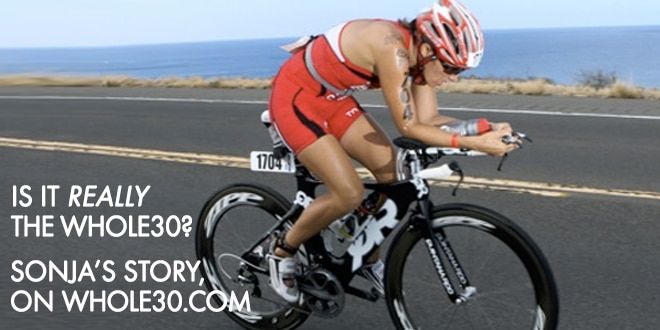We recently received a note from a high-level endurance athlete writing about her Whole30 experience. Sonja Wieck wrote:
I recently completed a Whole30 several months back. I felt really great. I am an 11-time Ironman athlete (performance-driven, and competing at a very high level). In fact, I completed an Ironman on day 12 of my first Whole30! I was not complaint on Day 4 when I had one of my last big long rides, and I wasn’t compatible on race day, since I stuck to my tried-and-true nutrition plan for the event. But I had a terrific race—I set a PR and the amateur record on the course. I felt more metabolically efficient, my racing nutrition lasted me much longer than usual, and I experienced much better than normal recovery. I am sold on this way of eating. After my 30 days were over, I tried to do your recommended pre/post meals, but I wasn’t having good success with that, so I went back to a (non-Paleo) energy drink/recovery drink protocol. Heading into a new Whole30 during the new year, I’ve been very clear on my blog that I would be using my non-compatible drinks during training and recovery, but everything else would be Whole30. And now, I’m getting some flak on my blog. According to some commenters, I cannot call myself “on a Whole30” and I am a Whole30 sham. What I thought was a way to find more health, a way to be an experiment of one, has now become an exclusive club that I’m not allowed to say I’m in because I have a recovery drink after some of my bigger sessions. I’m about to throw the baby out with the bathwater and never mention the words Whole30 again, but I just thought I would send one email asking for a little clarification. Is it about experimenting with what works for you after an initial Whole30, or is the term Whole30 only allowed to be used when people are 100% compatible?
Sonja and Melissa have corresponded privately about this issue—but we felt the concept warranted some public discussion, and a few questions.
Is Sonja Doing the Whole30?
Technically, no. The Whole30 rules are very clear and very specific, and the drinks that Sonja is choosing to include as part of her performance-focused nutrition plan would mean technically she’s not doing the Whole30.
Should Sonja say she’s doing the Whole30?
She can absolutely consider this her version of the Whole30. It would probably be helpful if she put a disclaimer on her blog for those new to the program (which she has done), so that they didn’t get confused about the rules. It’s also extremely helpful for people to note that Sonja is an elite athlete competing at a very high level. She is getting paid for her performance, so her performance matters. This is critical to the situation.
Would we recommend doing the Whole30 + energy/recovery drinks?
Ninety-nine percent of the time, no. Why? Because our goal is to make the Whole30 as beneficial as it can be for as many people as possible looking to improve their health—and for the vast majority of people, processed shakes or energy drinks don’t make them healthier. So if anyone other than a professional athlete were to say, “Should I do a Whole30, but keep my recovery drinks?” we would encourage them to find a healthier, more whole foods-based option for the duration of the program. Here’s some tough love for you: As a performance-driven elite athlete, Sonja makes a few deliberate concessions during her Whole30’s for the sake of her athletic goals. Unless you are getting paid to exercise, we cannot recommend this approach. As a 34-year-old father of two who exercises for fun, you have no need to bend the Whole30 rules to include a whey recovery shake after your 12-minute CrossFit workout. Really, you don’t. But as Sonja is getting paid to exercise and her performance is paramount, she makes a judgment call to include some off-plan beverages during her training sessions. We can’t condone the approach, but we respect her decision. (And, of course, it’s always your right to make your own decisions around food, even when you’re “on the Whole30.” We won’t show up at your house to slap the shake out of your hand, even if we think it’s a bad idea.) For professional athletes, however, we might make some concessions. Can a performance-focused athlete do the Whole30 100% by the book and still remain at the top of their game? Yep. We’ve seen it firsthand. But if your performance matters to the degree that you cannot allow it to suffer, even if it perhaps means compromising your health, then maybe you’ll have to tweak the Whole30 so it works for your goals. And if that’s the case, we’d rather see you eating 95% Whole30-compatible than abandoning the Whole30 altogether.
Should Sonja keep eating Whole30 style + soy and dairy-based recovery drinks?
Absolutely. Sonja figured out based on her first Whole30 that our real-foods approach works for her. It makes her healthier, it makes her happier, and it helps her perform better at her sport. She tried implementing our recommended workout-specific recommendations, and that hurt her performance. So she took what she learned about which foods she can tolerate and which she cannot and applied that knowledge in real life, in her individual context as a competitive athlete. Now, Sonja is working her own plan, carefully and deliberately, based on the information she gleaned from her Whole30 experience. She’s discovered a way to stay achieve her performance goals in the healthiest way posssible. Why shouldn’t she keep that up?
So Is It Really the Whole30?
Yes and no. It’s not a Whole30 by the books, the way we wrote it, because Sonja is deliberately including some off-plan foods. But would we call her a Whole30 sham, insist she compromise her performance goals just for the sake of following our rules, or suggest she was doing our program a disservice because of it? Never. Sonja writes,
“On this Whole30, I am getting back into serious training (20-25 hours a week). I tried to follow the Whole30 recommendations for pre/post/during fueling, but it wasn’t working for me. Rather than throw the baby out with the bathwater I switched my post/during to a dairy/soy-based recovery drink, and keep the rest of my diet Whole30 compatible. Having gone through Whole30 once I understand better how grains, dairy, and sugar affect me. With that in mind, this is a good plan for me—an endurance athlete who sometimes has four training sessions in a day. Everyone is going to be different.”
While we might not agree with Sonja’s approach (not being high-level, performance-driven athletes ourselves), or recommend it for anyone else, we applaud Sonja’s hard work in finding a real foods-based approach that works for her. We think it’s fabulous that Sonja has learned that Whole30 eating + more “traditional” recovery practices make her happier, healthier, and perform better—and we’re proud to call Sonja a bona fide Whole30’er.
Want to maximize your nutrition strategy as an avid exerciser, weekend warrior, or competitive athlete? Register for a Whole Athlete seminar in Houston or Memphis, or come to our special Health and Performance Seminar in Park City (registration link coming soon).
















